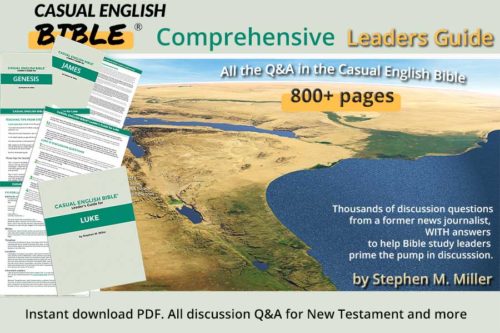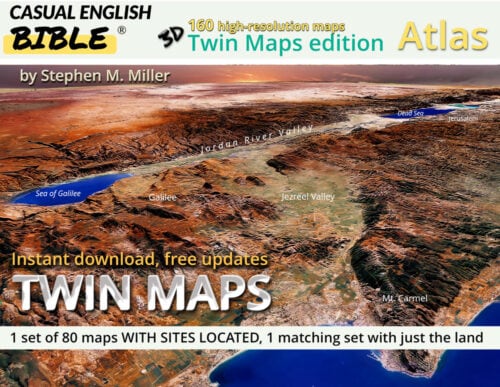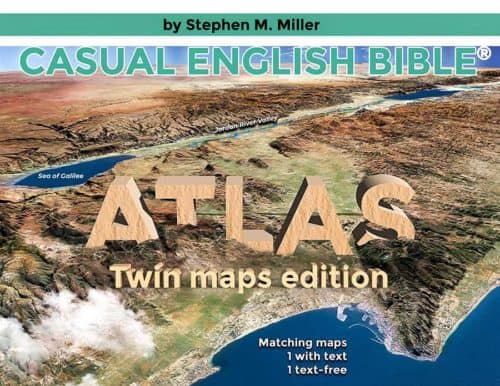Judges 20
Israel almost annihilates Benjamin tribe
Israel’s civil war council
1Israel called a war council, and the Israelites came from everywhere in the region. They came from Dan’s tribe [1] on Israel’s northern border to the town of Beersheba in the southern desert. They met at the town of Mizpah [2] in a sacred meeting. 2Tribal leaders took their places at the meeting. They came with a total of 400,000 armed warriors.3People in Benjamin’s tribe heard about the meeting at Mizpah. Israelites at the meeting asked, “How did this crime happen?”
4The Levite whose wife had been murdered said, “I went to Gibeah, a town in Benjamin’s tribe. I went there with my concubine to spend the night and move on. 5Men of the town came after me that night. They surrounded the house where we were staying. They planned to kill me. And they did kill my concubine—they raped her to death.
6I took her body home, cut it into pieces, and sent the pieces throughout Israel’s territory. What those men of Gibeah did was vile and evil. 7So here we are, meeting to consider what to do about it. What do you think?” Israel declares war on fellow Israelites 8Israelites there agreed, “We’re not going home. None of us. 9We’re going to choose at random [3] who attacks Gibeah. 10We’ll put one tenth of the men on a supply detail. They’ll get the food we’ll need. The rest of the army will punish Gibeah for what their men did by polluting Israel. It was shameless.
11The tribal warriors formed an army, united against Gibeah. 12Israel’s army sent messengers to Benjamin’s tribe asking, “What happened? How could you let your men commit a sick and disgusting crime like this? 13Give us the men who committed this horrible crime. We’re going to execute them. They’ve polluted Israel and we’re going to clean up this mess.” Benjamin’s people refused. They wouldn’t listen to their fellow Israelites.
Benjamin tribe musters an army
14Instead, Benjamin’s men rallied at Gibeah to fight the other Israelite tribes. 15Benjamin’s army numbered 26,000 armed men. They came from cities throughout the tribe’s territory.16Their army included an elite force of slingers—700 left-handed men who could sling a stone at hair and give it a haircut. They never missed. 17The opposing Israelites produced an army fifteen times larger: 400,000 armed men, every one a warrior.
Asking God for advice
18The invading Israelites decided to go to nearby Bethel [4] to ask God, “Which tribe should attack Benjamin first?” The LORD said, “Judah goes first.” 19The next morning, the tribes of Israel took up positions outside Gibeah. 20They arranged their warriors into battle formations. Israel’s first lost battle 21Benjamin’s warriors attacked from Gibeah and killed 22,000 opposing Israelites. 22The Israelites went back to Bethel, where they had been the day before.23They went there to mourn the men who died and the battle they lost. They stayed all day, until evening. They asked the LORD, “Should we keep fighting our people from Benjamin?” The LORD said, “Go and fight them.”
Israel’s second loss
24Israel’s coalition army of tribes advanced toward Gibeah for a second day of battle. 25Again, Benjamin attacked from Gibeah. They killed another 18,000 armed Israelite fighters.26This time the entire Israelite army went back to Bethel. They cried and fasted—skipping food until sunset. Then they sacrificed burnt offerings and peace offerings [5] to the LORD. 27Israelites again took their question to the LORD. The box [6] that held the Ten Commandments was there at the time. [7] 28Phinehas was Israel’s priest. He was the son of Eleazar and grandson of Aaron. Israelites asked the LORD, “Should we attack our people of Benjamin again, or stop fighting?” The LORD said, “Go again. I’ll give them to you this time.”
Final battle for Gibeah
29Israelites set up an ambush this time. 30The rest of the army took up positions outside Gibeah like they had done before.31This time when Benjamin’s men attacked, Israelites drew them further away from the city. At first, Benjamin got the upper hand, as before. They killed about 30 Israelites along the main roads, including one road that led up to Bethel, one to Gibeah, and one to the open countryside.
32Benjamin’s fighters said, “We’re doing it again. Crushing them.” The opposing Israelites said, “Let’s pull back and draw them away from the city, toward the roads.” 33So, Israelites fell back to Baal-tamar. [8] That’s when Israelites hiding in ambush west of Geba [9] attacked.
34Ten thousand of Israel’s best warriors rushed into what became a fierce battle. Benjamin’s warriors didn’t know what hit them. 35The LORD defeated Benjamin that day. Israelites killed 25,100 armed men of Benjamin. 36People of Benjamin realized they had lost the battle. Opposing Israelites had pulled back their battle lines on purpose, to draw out Benjamin’s fighters. This opened a path for Israelites who had been hiding in ambush to attack the city of Gibeah.
Israelites burn Gibeah
37Israelites swarmed into Gibeah and killed everyone inside. 38Before the battle, Israelites had agreed that once the ambushers took the city, they would signal the main attack force with a cloud of smoke from inside Gibeah.39Then, the main force that had been retreating would turn and attack Benjamin’s army. By then, Benjamin’s men had killed about 30 Israelites. And they were saying, “We’re doing it again. We’re going to defeat them like we did before.” 40But that changed the moment they saw smoke rising above the city behind them and realized Gibeah was on fire.
41That’s when the retreating Israelites turned on Benjamin and attacked. Benjamin’s stunned warriors realized they were about to die. 42They ran for their lives toward the desert. But the opposing Israelites ran them down and killed them, along with anyone inside the city who tried to escape. 43Attacking Israelites cut off Benjamin’s escape routes, chased the fleeing warriors, and then caught the last of them east of Gibeah as they ran for the desert wasteland.
Body count
44That day, 18,000 brave warriors of Benjamin died on the battlefields. 45Another 5,000 died running toward Rimmon Rock in the desert. And another 2,000 died when Israelites caught up with them near Gidom. [10]46In all, Benjamin lost 25,000 armed warriors that day. Every one of them brave. 47Another 600 men escaped to Rimmon Rock in the desert. They hid there four months. 48In the meantime, opposing Israelites went back to Benjamin’s territory. They traveled from town to town, burning each city and killing all the people and their animals. [11]
Footnotes
Dan’s tribe, originally assigned land along the coast, was unable to defeat the locals—which apparently included the fighting Philistines with their armored chariots.
Mizpah’s location is uncertain.
More literally, they were to throw or draw “lots.” The “lots” may have been stones or animal bones marked in a way that produced random outcomes for “yes” or “no” answers, or for determining who goes first in a group. The idea is like throwing dice, with the high number going first. It’s also a little like “heads” or “tails” from a coin toss.
Bethel, today’s Beitin, is about seven miles (12 km) north of Gibeah—less than half a day’s walk. That’s where the Israelites had set up their tent worship center (20:27).
Burnt offerings involved sacrifices to atone for sinful behavior. The entire animal was burned on an altar. See Leviticus 1. A peace offering, described in Leviticus 3, is one of several prescribed offerings in Jewish tradition. When Jewish people wanted to give thanks to God for something, such as good health or safety, they would sacrifice a sheep, goat, cow, or bull. They would burn part of the animal, including the kidneys and fat covering the intestines. They would eat the rest in celebration, often with family and friends. It takes a fair number of hungry people to eat a cow. But people were eager to eat meat because it was rare in Bible times for common folks to eat meat, many Bible scholars say.
Better known as the Ark of the Covenant, this was Israel’s most sacred relic. Israelites kept it in the Most Sacred Room in the tent worship center.
The strategy copies one Joshua used in the battle at Ai (Joshua 8). Some scholars say that editors pulling the story together borrowed some details from Joshua’s story, which they say helps explain why the story reads a bit choppy.
Location is unknown, but probably near Gibeah.
Many say Geba is today’s Palestinian city of Jaba, about three miles (5 km) northeast of Gibeah.
Gidom’s location is unknown.
This was similar to what Joshua and the invading Israelites did to the Canaanites who lived in the land. The Hebrew word that describes it is herem, “annihilate.” They promised to annihilate the Canaanites. Moses had told them, “When the LORD your God gives them to you, you’ll need to finish them off. After you defeat them in battle, wipe them out by killing them all. Don’t make any peace treaty with them. Don’t show them mercy” (Deuteronomy 7:2). Scholars describe it as a “curse of war” or a “ban.” The “ban” means that when soldiers conquer a city, for example, they are banned from keeping anything for themselves—everything in the city is under the curse of war and must die. This kind of vow in ancient times was considered irrevocable and irredeemable. You couldn’t take it back. And nothing of the enemy was allowed to live. Everything in the city was devoted to God, much like sacrificial animals that are slaughtered and burned. “It’s a vow of devotion. If something is devoted to the LORD—whether human, animal, or land—you can’t have it back. If you devote something in this unique way, it’s holy and it stays holy because it belongs to the LORD…You can’t reverse that. You can’t buy back that person’s life. That person is doomed to die” (Leviticus 27:28-29). Joshua fought by those rules. And, apparently, so did the Israelites fighting Benjamin. Many Christians today struggle with this part of the story, which they say sounds like genocide. Others say if God ordered the people killed, it’s not our place to question it. Yet many seem to doubt that God did. They say an order like this in no way resembles the God we see in Jesus of the New Testament.
Discussion Questions
- Sorry, there are currently no questions for this chapter.










